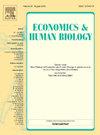欧盟经济自由与性别健康差距
IF 1.8
3区 医学
Q2 ECONOMICS
引用次数: 0
摘要
本文调查了欧盟成员国经济自由与性别健康差距之间的关系。根据欧洲性别平等研究所(European Institute for Gender Equality)和弗雷泽研究所(Fraser Institute)经济自由指数(Economic Freedom Index)的数据,该分析探讨了自由经济政策如何影响男女之间的健康差距。虽然自由改革常常被提倡以提高整体经济效率,但它们对按性别划分的健康结果的影响是微妙的。调查结果表明,经济自由的某些方面,如监管和贸易政策,可以减少或加剧两性健康不平等,这取决于所考虑的领域和具体指标。值得注意的是,劳动力市场放松管制往往对妇女不利,而司法独立的增加和贸易壁垒的减少则显示出混合的效果。本文采用带有工具变量的面板数据计量经济学来解决潜在的内生性问题,揭示了经济政策与健康不平等之间复杂的、通常是非线性的关系。这些见解表明,自由主义改革并非性别中立,可能需要补偿性社会政策来确保公平的保健结果。这项研究强调了在设计和评价经济政策,特别是卫生相关领域的经济政策时考虑性别平等的重要性,从而有助于一个未得到充分探讨的领域。本文章由计算机程序翻译,如有差异,请以英文原文为准。
Economic freedom and gender health gap in the E.U.
This paper investigates the relationship between economic freedom and the gender health gap across European Union member states. Drawing on data from the European Institute for Gender Equality and the Fraser Institute’s Economic Freedom Index, the analysis explores how liberal economic policies influence health disparities between men and women. While liberal reforms are often promoted for enhancing overall economic efficiency, their impact on gendered health outcomes is nuanced. The findings suggest that certain aspects of economic freedom, such as regulatory and trade policies, can either reduce or exacerbate gender health inequalities, depending on the domain and specific indicator considered. Notably, labour market deregulation often disadvantages women, while increased judicial independence and reduced trade barriers show mixed effects. The paper employs panel data econometrics with instrumental variables to address potential endogeneity, revealing complex, often non-linear relationships between economic policy and health inequality. These insights imply that liberal reforms are not gender-neutral and may require compensatory social policies to ensure equitable health outcomes. The study contributes to an underexplored area by highlighting the importance of considering gender equity in the design and evaluation of economic policy, particularly in health-related domains.
求助全文
通过发布文献求助,成功后即可免费获取论文全文。
去求助
来源期刊

Economics & Human Biology
医学-公共卫生、环境卫生与职业卫生
CiteScore
4.50
自引率
12.00%
发文量
85
审稿时长
61 days
期刊介绍:
Economics and Human Biology is devoted to the exploration of the effect of socio-economic processes on human beings as biological organisms. Research covered in this (quarterly) interdisciplinary journal is not bound by temporal or geographic limitations.
 求助内容:
求助内容: 应助结果提醒方式:
应助结果提醒方式:


